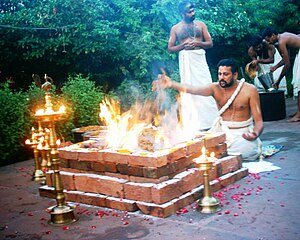
Back হোম AS হোম (হিন্দু আচার) Bengali/Bangla Homa (ritual) Spanish Homa (rituel) French હોમ GU हवन HI Homa ID 護摩 Japanese ಹೋಮ KN 호마 (의식) Korean

| Part of a series on |
| Hinduism |
|---|
 |
In Indian religions, a homa (Sanskrit: होम), also known as havan, is a fire ritual performed on special occasions. In Hinduism, by a Hindu priest usually for a homeowner ("grihastha": one possessing a home). The grihasth keeps different kinds of fire including one to cook food, heat a home, among other uses; therefore, a Yajna offering is made directly into the fire.[1][2] A homa is sometimes called a "sacrifice ritual" because the fire destroys the offering, but a homa is more accurately a "votive ritual".[1] The fire is the agent, and the offerings include those that are material and symbolic such as grains, ghee, milk, incense, and seeds.[1][3]
It is rooted in the Vedic religion,[4] and was also adopted in ancient times by Buddhism and Jainism.[1][3] The practice spread from India to Central Asia, East Asia, and Southeast Asia.[1] Homa rituals remain an important part of many Hindu ceremonies, and variations of homa continue to be practiced in current-day Buddhism, particularly in parts of Tibet and Japan.[4][5] It is also found in modern Jainism.[4][6]
A homa is also called yajna in Hinduism, sometimes for larger public fire rituals, or jajnavidhana or goma in Buddhism.[3][7] In modern times, a homa tends to be a private ritual around a symbolic fire, such as those observed at a wedding.[8]
- ^ a b c d e Richard Payne (2015). Michael Witzel (ed.). Homa Variations: The Study of Ritual Change Across the Longue Durée. Oxford University Press. pp. 1–3. ISBN 978-0-19-935158-9.
- ^ Hillary Rodrigues (2003). Ritual Worship of the Great Goddess: The Liturgy of the Durga Puja with Interpretations. State University of New York Press. pp. 329 with note 25. ISBN 978-0-7914-8844-7.
- ^ a b c Axel Michaels (2016). Homo Ritualis: Hindu Ritual and Its Significance for Ritual Theory. Oxford University Press. pp. 237–248. ISBN 978-0-19-026263-1.
- ^ a b c Cite error: The named reference
Witzel2015p143was invoked but never defined (see the help page). - ^ Cite error: The named reference
mushashit126was invoked but never defined (see the help page). - ^ Cite error: The named reference
phyllisgranoff399was invoked but never defined (see the help page). - ^ Richard Payne (2015). Michael Witzel (ed.). Homa Variations: The Study of Ritual Change Across the Longue Durée. Oxford University Press. pp. 30, 51, 341–342. ISBN 978-0-19-935158-9.
- ^ Axel Michaels (2016). Homo Ritualis: Hindu Ritual and Its Significance for Ritual Theory. Oxford University Press. p. 246. ISBN 978-0-19-026263-1.